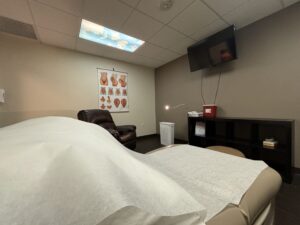- Slug: AHCCCS Funding. 550 words.
- File photo available (thumbnail, caption below).
- Voiceover available.
By Lizeth Adriana Calderon
Cronkite News
PHOENIX – Roughly a fifth of expecting and new mothers in Arizona receive little to no prenatal care, which can lead to poor health outcomes for mothers and their children, according to the March of Dimes report from last year.
Overall the health of mothers and infants in the U.S. is on decline, partially because more than a third of Americans live in maternal care deserts, according to the subsequent March of Dimes report. A maternity care desert is an area where access to reproductive health care is limited or women face other obstacles in their ability to access care.
Although Arizona has fewer counties that are maternity care deserts compared to the national average, 20% of expecting or new mothers receive inadequate or no care, which is higher than the U.S. rate of nearly 15%.
The state’s Medicaid agency, Arizona Health Care Cost Containment System (AHCCCS), gave $2.5 million to four rural health centers to fund on-call maternity care services in August 2024. Senate Bill 1720 funded the initiative, allocating a total of $7.5 million over the course of three years to on-call OB-GYN providers in rural and other communities where the services are not available.
The Mariposa Community Health Center in Nogales, Arizona, received more than 80% of the AHCCCS funds this year. According to the center’s chief medical officer, Eladio Pereira, one of the major challenges in maternity care is the lack of obstetric and health-care providers. “Staffing is a challenge, to be able to recruit both nurses and physicians to the area,” Pereira said.
According to the American College of Obstetricians and Gynecologists, the nation could face a shortage of 22,000 obstetricians and gynecologists by 2050. Pereira said the AHCCCS funding will help to recruit more providers and start new programs, such as boosting support for mothers’ mental health during and after pregnancy. “We know that mental health issues play a role in negative outcomes … a report showed that about 32% of the mortality of women occurs from about day seven to the end of the first year postpartum. We’re putting a lot of emphasis in screening for depression, screening for domestic violence and and all those issues that can create harm in the postnatal period,” Pereira said.
Income and inability to access care are major reasons behind pregnancy-related deaths, of which, the CDC reports, more than 80% are preventable.
“We pay a lot of attention to some of the physical causes of morbidity and mortality, and those are extremely important, but we know a lot of research has shown that mental health is actually the number one underlying cause of maternal mortality, and focusing on these efforts will also make a huge role in rural areas and beyond,” said Rachael Salley, Maternal Child Health EPSDT manager at AHCCCS.
Pereira said he feels very optimistic and thinks that health centers like Mariposa are increasing the awareness of this “crisis” in rural towns. “Taking care of pregnant women is a privilege. They carry our future, and so it’s really important that we work hard to minimize any negative outcome, both for the mom and the baby, and the way of doing that is ready access to health care and ready access to manage any complications that come as a result of pregnancy,” Pereira said.
For more stories from Cronkite News, visit cronkitenews.azpbs.org.
